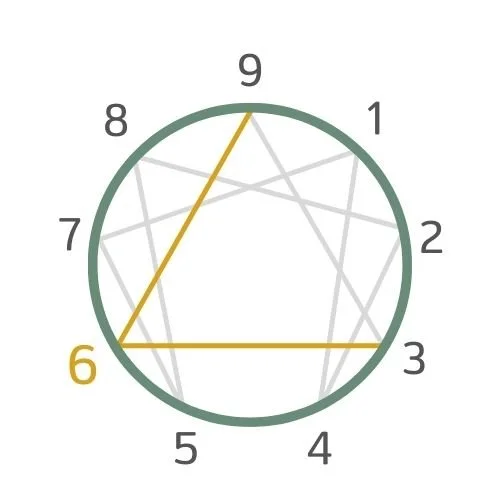Working with an Enneagram Therapist: How Type 6s Can Benefit from Therapy
Learning about Enneagram type 6 has felt so validating! It’s always felt strange to you that others don’t see or take things as seriously as you do. You know that you worry and think about all of the “what if’s” and worst case scenarios, but now you understand why. Understanding is highly helpful and you want to know more. The anxiety and self-doubt really takes a toll on you. You want to learn how to be more confident and how to not have to worry all of the time. You want to learn how to lessen your anxiety and how to stop yourself from overthinking. It’s exhausting.
The Enneagram is such a powerful tool to use in therapy or Enneagram coaching. When my clients find their correct type and resonate with the work of that type, it accelerates their self-awareness and self-growth. The Enneagram acts like a mirror and a compass. My clients can see the good, the bad, and the ugly AND understand what’s keeping them stuck. They learn how to break the cycles that are keeping them stuck and preventing them from thriving. If you study the Enneagram, you know that it goes SO MUCH deeper than what a small blog or social media post can describe. The Enneagram is just as complex as the humans it represents. Keep that in mind, and here are some basics about Enneagram Type 6.
Type 6
Core Emotion: Fear (Avoiding)
Filter: The world isn’t safe and I can’t trust
Energetics: Friendly, intellectually quick, alert, connected,
Traits: Trustworthy, down to earth, rebellious, skeptical, logical, fearful or fearless, paradoxical
Values: Honesty, integrity, loyalty, compassion, playing devil's advocate, skepticism
Childhood: Learned early on that the world is not safe and that they must be vigilant
Not afraid to: Show up in crisis (except they fear it) be courageous (except they fear it) express doubt
Hard for them to: Trust themselves or others, sit with doubt, sit with betrayal
Common Experiences for 6’s
Running though all of the worst-case scenarios in their mind, seeing how things could go wrong
Distrusting authority and simultaneously really wanting to find something to trust
Easily playing devil's advocate and doing risk assessment- surprise when others don’t see the value in this
Feeling annoyed or self-conscious when others are impatient with their questions
Feeling deep loyalty to those they care for and trust
Rooting for the underdog and getting upset when systems squish or overpower
Hypervigilance around safety- either worrying about things going wrong, needing certainty, or proving to themselves that they are tough by rejecting or overcoming fear (counterphobic 6)
Type 6 Trauma Response
Seeks Safety Through Analysis and Risk Assessment
Consistently hypervigilant and alert
Predicts the risk of things going wrong in an effort to mitigate risk and avoid crisis OR does it anyway to face fear
“Unsafe” scenarios could be natural disasters, everyday occurrences, or relationships
May feel very anxious about making others mad and go to a lot of effort to avoid upsetting others
OR may intentionally poke at others to make them mad or get them riled up
Extreme self-doubt and second guessing. May lead to increased susceptibility to gaslighting
OR substantial level of distrust in others and great suspicion of hidden agendas or incompetency
Overly trusting people, even if they are causing harm, OR trusting no one except themselves even in safer relationships
Expectations of disaster and the inability to feel calm and secure
Trauma increases fear or numbs it. Increased fear can lead to not ever taking risks and avoiding important life tasks or desires.
Numbed fear can lead to impulsivity and unsafe risk taking to prove that fear does not have control over them
Holding a core belief that it is not safe to trust. It can feel extremely unsafe to have trust in self or trust in others
No matter where you are in your Enneagram journey, working with an Enneagram therapist will help you create the kind of change you desire in your life. It will help you understand and remove the barriers that your type is creating to having the kind of love and relationships that you want. My goal is for you to walk away from therapy with confidence and a feeling of empowerment. I will help you get clarity on what you need to do to grow into the healthiest version of your type. Our Enneagram work and trauma work is never really fully complete, but Enneagram therapy can help you gain clarity on what you need to heal.
Learn more about working with Hanna
If you are ready to get started, the first step to working together is to schedule a free 20 minute consultation. Investing your time, money, and emotional energy into therapy or coaching is a big deal. It’s an investment in yourself and your wellbeing. It’s important that you make this investment with trust and confidence that working together is a good fit. This is why I offer a 20 minute consultation. During this time we can identify your needs and answer any questions that you have about working together.
Hanna Woody is a Licensed Clinical Mental Health Counselor in Asheville, North Carolina. She has over 12 years of professional counseling experience and specializes in breaking cycles of intergenerational trauma, childhood trauma, and the Enneagram. Certified in the Embodiment Tradition, she has over 150 hours of training and teaching experience. Hanna is in private practice and provides online mental health therapy, Enneagram coaching, and Enneagram training.
Therapy in Asheville, Raleigh, Charlotte, Winston-Salem, Greensboro and all North Carolina regions.
Therapy for Childhood Trauma, Anxiety Therapist, Childhood Trauma Therapist, Therapy for Cycle Breakers, Enneagram Therapy, Enneagram Therapist, Enneagram Coaching
